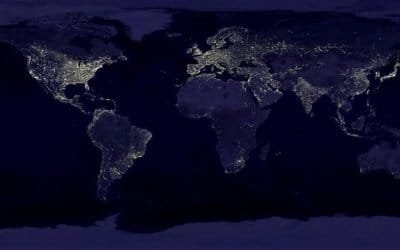University of Calgary, my employer, recently announced that this year it will require all newly-admitted students to read “No Impact Man,” the New York-based author Colin Beavan’s account of living for a year in Manhattan in an effort to strive for “zero environmental impact.” According to Dru Marshall, provost and vice president at the University of Calgary, “Sustainability, development of leadership skills, and connection to community are three of our academic priorities – and so the selection of No Impact Man as the book for our common reading program for incoming students is a perfect fit.”
While such a choice for common reading at a university is not surprising, given the dominance of environmentalist ideology and altruism in today’s culture, it is disheartening because instead of teaching students something of value, the book promotes anti-human ideas in a mundane, concrete-bound way. The reading selection committee at my university has bought into the false idea that human activity is destroying the planet, and the solution is to aim for “no impact” by minimizing production and consumption. Hence the choice of “No Impact Man,” to provide students concrete tips on how to reduce the consumption of everything from electricity to toilet paper. Somehow this is supposed to develop leadership skills and “connection to community.” (Full disclosure: I have read only excerpts; reading the full book would not be a productive use of my time).
But reducing consumption of material values is not an ideal—if we want to live and flourish. Living without electricity—without a refrigeration, electric lighting, air conditioning, elevators, fossil fuel-powered transportation, and without a vast array of products either made with or from fossil fuels—is not a noble achievement but a depravation of human well-being and enjoyment. Human survival and flourishing require producing and consuming material values, not giving them up. We produce material values from food and clothing to houses, cars, cell phones, gas furnaces, tablet computers, medicines, and countless other goods by exploiting and shaping raw materials that exist in nature. To have no impact means to produce nothing—which, by human standards, means death. Without production there is no consumption, the fact “No Impact Man” conveniently ignores. Beavan and his family can only survive because someone used energy and raw materials to build the apartment building in which they live, to produce their furniture and other household goods, their books, their clothing, and their food.
Unlike animals, we cannot flourish, let alone survive, by consuming values readily available in nature. (That would mean a return to hunting and gathering—which would be truly unsustainable for the world population of over 7 billion people.) We must produce material values by shaping nature for our needs:
“The virtue of productiveness is the recognition of the fact that productive work is the process by which man’s mind sustains his life, the process that sets man free of the necessity to adjust himself to his background, as all animals do, and gives him the power to adjust his background to himself.” – Ayn Rand, The Virtue of Selfishness
Far better required reading than “No Impact Man” for students at the University of Calgary and elsewhere would be books that teach them to use reason for solving true problems of human survival and well-being, such as how to create more wealth to eradicate poverty, malnutrition, debilitating illnesses, harmful viruses, traffic congestion. Instead of no impact, applying reason in such a way would have an impact on the planet—which is a proper human goal.




